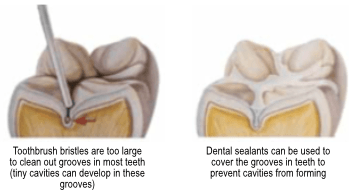What are fissure sealants ?
What is dental sealant?
A dental sealant is a protective clear plastic layer that is brushed onto the chewing surfaces of teeth to 'seal them off' from the plaque and bacteria that cause cavities to form.
Typically, sealants are applied to the molars, because it is these teeth that do the most chewing and have deep crevices in which bacteria can hide. The sealant will fill in and cover any crevices on the tooth to act as a shield from the bacteria. What makes them even better is that the sealant application process is quick and painless!
Fissure Sealants are one of the greatest advances in the field of Preventive Dentistry. Since they were first introduced in the USA in late 1960, they have become widely regarded as the technique that has contributed most significantly to lowering the caries rate in children.
Why are dental sealants so effective?
Dental decay is most likely to develop on your child's molars when they first erupt at the age of 6. At this age, the top (or chewing surface) of these teeth is not fully mineralised, and therefore more susceptible to decay. At the same time, the anatomy of the chewing surface contains numerous grooves and deep pits, known as fissures. These fissures are usually so narrow that toothbrush bristles are unable to clean them properly.This allows bacteria to flourish and decay to form. By applying a fissure sealant, we make the surface of the tooth smooth – which leaves decay with nowhere to develop. Fissure sealed teeth are 80% less likely to get caries.
Life expectancy nowadays is approximately 80-90 years. So, if your child’s first adult teeth erupt at 6 years of age, they will have to keep them healthy for the next 80 years or so!!! We believe that this makes treating their teeth at a young age a worthwhile investment.
How dental sealants are applied at Happy Kids Dental
 The sealant application process at Happy Kids Dental is quick and painless:
The sealant application process at Happy Kids Dental is quick and painless:
- The sealant is painted onto the tooth, filling depressions and grooves
- Hardening takes place in a matter of seconds with the assistance of dental curing light
- Most applications will last between three and five years with normal chewing and biting.
The dental sealant procedure is technique sensitive. For this reason, it is highly advisable to visit a dentist who specialises in children’s dental care, and is therefore well-equipped to administer the procedure. The most important factor in determining the longevity of the seal between the tooth surface and the fissure sealant is moisture control. To avoid any contamination with saliva, at Happy Kids Dental, we undertake fissure sealant placements with a rubber dam or Isolite
When should your child get sealants?
The best time to bring your child in for dental sealants is around the time their adult molars begin to erupt (usually age 6).
We are often asked by parents to provide a timeline of tooth development, to ensure no new adult teeth are missed:
- 6-7 years of age - all four adult molars should be sealed
- 10-12 years - first and second adult premolars usually erupt (these adult teeth replace your child’s baby molars)
- 12-13 years - second adult molars erupt
The sooner the sealants are in place, the less opportunity the oral bacteria will have to build up.
However, sealants are still beneficial, even when applied later on. So, the treatment comes highly recommended for older children too.
What is the cost of dental sealants at Happy Kids Dental?
Sealants are a cost-effective preventative option, and when used along with regular dental check-ups and cleanings, provide the most effective defence against tooth decay. The cost of a sealant application per baby tooth is £45, and the cost per adult tooth is £55 - £75.
Can I protect my child’s teeth through good hygiene & limiting sugar intake?
It is critical we teach our children good oral health habits from an early age. Worryingly, 40% of children develop cavities by the time they start school due to poor oral hygiene and the consumption of sugary snacks and drinks.
Everyone’s mouth contains multiple species of bacteria. When we consume sugar, these bacteria produce acid on our teeth. Over time, this acid wears away at our enamel and leads to tooth decay.
Brushing, flossing, and limiting our sugar intake are all important techniques for keeping this bacteria in check. However, even if we do all of these things correctly and regularly, there will still be fissures in our teeth where bacteria can hide. The depth of the fissure is genetically predisposed and not something you can change. Since these can be difficult to reach with a toothbrush, we need the help of sealants to add an extra layer of protection!
